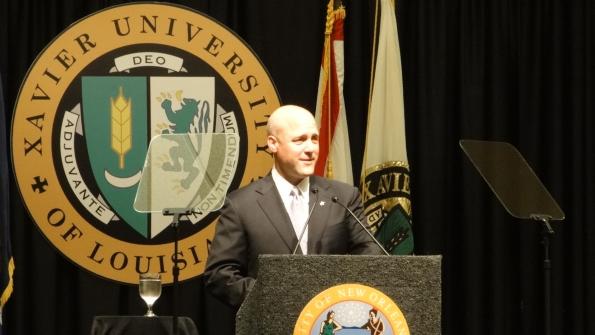U.S. Conference of Mayors elects new leadership, adopts city-geared resolutions at annual meeting
At its 85th annual meeting, held in Miami Beach, Fla., the U.S. Conference of Mayors (USCM) chose its new president and adopted resolutions across multiple categories that promote bipartisan actions.
New Orleans Mayor Mitch Landrieu, also the organization’s vice president over the past year, was named the 75th president of the USCM on June 26, according to a news release from the USCM. Columbia, S.C. Mayor Stephen Benjamin will serve as the USCM’s new vice president, while Rochester Hills, Mich. Mayor Bryan Barnett will serve as the new second vice president.
“We have outlined an ambitious – and achievable – agenda for the next years, and we’re looking forward to getting back out in our communities and making a difference, not just for our individual communities, but for the country,” Benjamin said in the news release. “Mayor Landrieu, Mayor Barnett and I are eager to work together on our collective national vision and produce local results.”
The adopted resolutions span 10 categories, per the organization’s site. Many of the resolutions dictate that the USCM collectively commends federal agencies or bodies for certain actions, while other resolutions show the USCM urging other agencies or bodies to reconsider certain actions.
Other resolutions support the general support of actions, funding and legislation regarding certain issues. Many resolutions encourage local governments to work with state and federal agencies to work towards these resolutions while furthering their own goals.
Per the organization’s site, some of the more city-specific resolutions include:
Children, health and human services
-
Urging all first responders to have access to the opioid overdose-reversing drug naloxone, while being trained in its use
-
Recognizing Beverly Hills, Calif.’s efforts to encourage a healthy city approach to government, while encouraging other cities to develop programs that advance community health and wellness.
Community development and housing
-
Mayors will continue to partner with stakeholders across all levels of government to end veterans’ homelessness
-
Supports preserving public housing in communities and preventing further unnecessary loss of it due to disinvestment
Criminal and social justice
-
Calling on cities to commit to adopting a neighborhood policing model
-
Calling on mayors and communities nationwide to join the initiative to Revive Civility and Respect
-
Encourages cities and states nationwide to take action to ensure inclusiveness while supporting mayors fighting against LGBT discrimination
Energy
-
Urging mayors to commit to strengthening ties between cities around climate change
-
Supporting cities in establishing community-wide targets of powering communities with 100 percent renewable energy by 2035
-
Encouraging electric utilities to invest more in electric transportation
-
Resolving to work with federal, state and local governments, utilities, companies and universities to accelerate the development of smart cities
Jobs, education and the workforce
-
Reaffirms support for America’s local public schools
-
Urging mayors and leaders of local agencies to incorporate arts, science and humanities education strategies
-
Urging local schools and districts to use arts-based strategies to achieve goals for reforming education
-
Urges cities to advocate for airports to provide family-sustaining jobs and boost communities’ economies
-
Encourages member cities to promote National Arts in Education Week
Metro economies
-
Supporting the tax exemption aspect of municipal bonds
Tourism, arts, parks, entertainment and sports
-
Urging mayors to invest in nonprofit arts organizations through local arts agencies
-
Encouraging mayors to designate October 2017 as National Arts and Humanities Month while building partnerships with local arts agencies and other arts and humanities community members in their cities to celebrate the month
-
Supporting the goal for cities to increase the number of people in urban areas who live within a 10-minute walk of a high quality park, while supporting investments in parks and open spaces in achieving this goal
Transportation and communications
-
Supporting local policymakers (as well as federal and state policymakers) to integrate electric, autonomous vehicles into their fleets
Not all mayors who are or have been affiliated with the USCM agree with certain policies advocated at the event. Oklahoma City Mayor Mick Cornett, also the immediate past president of the USCM, told The New York Times that climate change “isn’t my issue.” He added, “I’m not a me-too kind of guy.”
Jacksonville, Fla. Mayor Lenny Curry quietly exempted himself from the USCM in late 2016 or early 2017, according to Florida Politics. He told the news site that the group’s political positions and minimal value added to his office wasn’t a good use of taxpayer money.
“Mayor Curry is not a member of the U.S. Conference of Mayors. He maintains his support of the President’s commitment to keeping America safe,” Marsha Oliver, director of public affairs for the mayor’s office, told Florida Politics.
In his inaugural remarks as president of the USCM, Landrieu stressed that finding political common ground was key in building a better future, and that mayors are and would continue to “lead the way on issues big and small.”
“We can see that the solutions to this country’s problems won’t come from the halls of Congress or the boardrooms on Wall Street, but instead will emerge from the Main Streets and byways of this great country,” Landrieu said. “That is our wheelhouse. This is our playing field. We are the inheritors of a great legacy and with that comes great responsibility.”
_____________
To get connected and stay up-to-date with similar content from American City & County:
Like us on Facebook
Follow us on Twitter
Watch us on YouTube




















